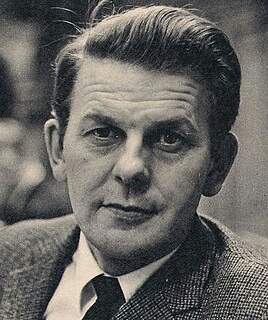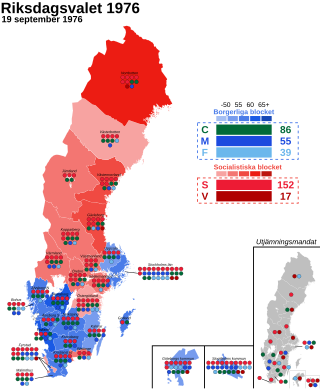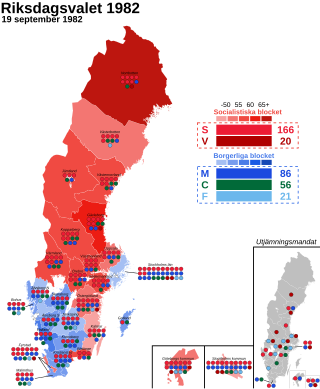
The politics of Sweden take place in a framework of a parliamentary representative democratic constitutional monarchy. Executive power is exercised by the government, led by the prime minister of Sweden. Legislative power is vested in both the government and parliament, elected within a multi-party system. The judiciary is independent, appointed by the government and employed until retirement. Sweden is formally a monarchy with a monarch holding symbolic power.

The Centre Party is a liberal political party in Sweden, founded in 1913.

Nils Olof Thorbjörn Fälldin was a Swedish politician. He was Prime Minister of Sweden in three non-consecutive cabinets from 1976 to 1982, and leader of the Swedish Centre Party from 1971 to 1985. On his first appointment in 1976, he was the first non-Social Democrat Prime Minister for 40 years and the first since the 1930s not to have worked as a professional politician since his teens. He was also the last Prime Minister to not be from the Social Democrats or Moderate Party.

Stig Kjell Olof "Ola" Ullsten was a Swedish politician and diplomat who was Prime Minister of Sweden from 1978 to 1979 and leader of the Liberal People's Party from 1978 to 1983. He also served as Deputy Prime Minister briefly in 1978 and then again from 1980 to 1982 and served as Minister for Foreign Affairs from 1979 to 1982. Ullsten is Sweden's only Liberal prime minister since the 1930s.

Tage Fritjof Erlander was a Swedish politician and statesman who served as the prime minister of Sweden and leader of the Social Democratic Party from 1946 to 1969. Previously, he served as minister of education from 1945 to 1946, and was a member of the Riksdag from 1932 to 1973. During his premiership, Sweden developed into one of the world's most advanced welfare states, with the "Swedish Model" at the peak of its acclaim and notoriety. His uninterrupted tenure of 23 years as head of the government is the longest ever in Sweden and in any modern Western democracy.

Karin Ann-Marie Söder was a Swedish Centre politician. She was the first woman in Sweden to be elected the leader of a major political party. She headed the Swedish Centre Party from 1985 to 1987. She was also one of the first female foreign ministers in the world.

Gunnar Hedlund was a Swedish politician who served as chairman of the Centre Party from 1949 to 1971. He served as Minister of the Interior 1951 from 1957 and was a member of the Riksdag (parliament) from 1942 to 1976.

Bengt Carl Gustaf Westerberg is a Swedish politician. He was leader of the Liberal People's Party from 1983 to 1995, member of the Riksdag from 1984 to 1994 and Minister for Social Affairs and Deputy Prime Minister 1991 to 1994.

General elections were held in Sweden on 19 September 1976. Although the Swedish Social Democratic Party remained the largest party, winning 152 of the 349 seats in the Riksdag, a coalition government was formed with the Centre Party, the People's Party and the conservative Moderate Party, which formed Sweden's first non-socialist government since 1936. Centre Party leader Thorbjörn Fälldin, who had widely been expected to take over the government in the previous election of 1973, was appointed Prime Minister, the first not from the Swedish Social Democratic Party since Axel Pehrsson-Bramstorp's brief interregnum 40 years earlier.

General elections were held in Sweden on 16 September 1979. Although the Swedish Social Democratic Party remained the largest party, winning 154 of the 349 seats in the Riksdag, the liberal interim government of Ola Ullsten was succeeded by another centre-right coalition government composed of the People's Party, the Moderate Party and the Centre Party, led by Centre Party leader Thorbjörn Fälldin. The three parties together won 175 seats, compared to the 174 won by the Social Democrats and Communists. It was the only time that non-socialist parties retained power in an election between 1928 and 2010. The Moderates dramatically increased their representation in the Riksdag, becoming the largest party of the non-socialist bloc, a position they maintained until 2022.

General elections were held in Sweden on 19 September 1982. They saw the return of the Swedish Social Democratic Party to power after six years in opposition, the longest period in opposition by the Social Democrats since the 1910s. The center-right coalition of Thorbjörn Fälldin had earlier suffered a loss upon the breakup of the government in 1981, the year before the election, when the rightist Moderate Party chose to withdraw from the government, protesting against the centrist tax policies of the Fälldin government. After regaining power, Social Democratic leader Olof Palme succeeded in being elected Prime Minister again, having earlier held power between 1969 and 1976.

The deputy prime minister of Sweden is the deputy head of government of Sweden. The incumbent deputy prime minister is Ebba Busch.

This article describes the history of Sweden from the late 1960s until 1991.
Olof Palme – En levande vilja: Tal och intervjuer is an audiobook on CD containing speeches and interviews with the former Swedish prime minister Olof Palme; ISBN 91-89080-95-5.
The third cabinet of Thorbjörn Fälldin was the cabinet and Government of Sweden from 22 May 1981 to 8 October 1982.
The first cabinet of Thorbjörn Fälldin was the cabinet and Government of Sweden from 8 October 1976 to 18 October 1978.
Events from the year 1979 in Sweden

The Minister of Economics was a member of the government of Sweden. The minister of economics was the head of the Ministry of Economics from 1976 to 1982 which dealt with long-term guidelines for economic policy, the principle orientation of financial and credit policy, international economic cooperation, statistics, questions regarding banking and insurance, the stock exchange and the monetary system.

The Minister for Physical Planning and Local Government was a member of the government of Sweden. The minister for physical planning and local government was the head of the Ministry of Local Government from 1974 to 1982 which was responsible for the county administrative boards, the municipalities, the tax charge offices, the local enforcement offices, etc., and later also questions regarding the Church of Sweden and other religious communities.

The Minister for the Budget was a member of the government of Sweden. The minister for the budget was the head of the Ministry of the Budget from 1976 to 1982 which was primarily responsible for budget regulation as well as the general administration and accounting of state funds, the state and municipal tax system. State land and buildings, alcoholic beverages, resident registration, press support and information, personnel administrative planning, personnel health care, etc. within the state's area of responsibility, administrative democracy, etc. and training of government employees.











